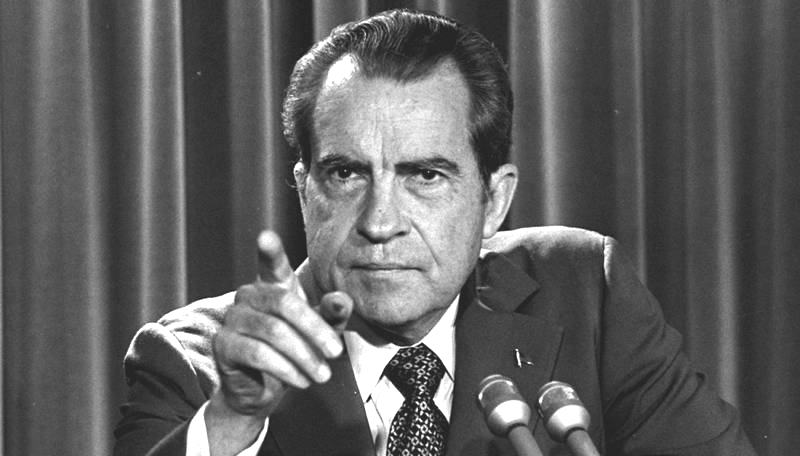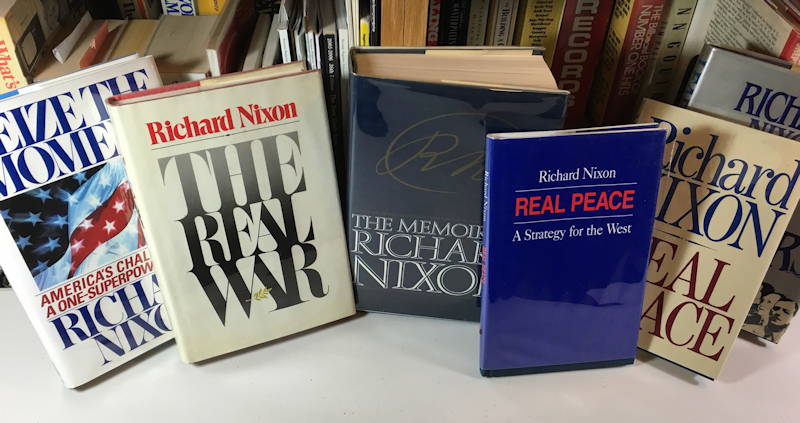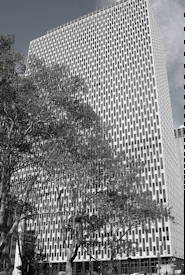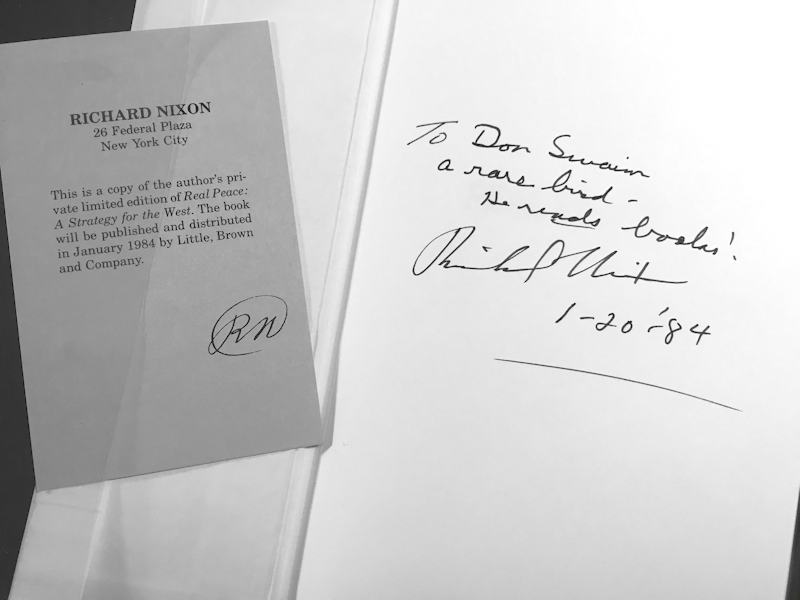MY RICHARD M. NIXON STORY
by Don Swaim
_________________________

In April 2016, Amazon released an utterly charming original online film for its "Prime" members called Elvis and Nixon, which is centered around the famous photo op between Presley and the President in Nixon's oval office in 1970. Hilarious and touching, it stars Kevin Spacey as Nixon, with all of his tics and mannerisms, even the voice, and Michael Shannon, who was in Boardwalk Empire, as the performer. Shannon doesn't look much like Elvis, but he has the quirks, traits, and voice down pat.
This led me to remember my own meeting with the complicated Nixon, and my one-on-one interview in his office at the Federal Building in Foley Square, Manhattan, in1984. It was actually my second meeting with him. Earlier, I was producer of a series of Presidential interviews with WCBS Political Reporter Steve Flanders, and that was when I first met Nixon and his spokesman.
Later, I was producer-reporter of a daily feature about books and authors called "Book Beat," and noticed in Publishers Weekly that Nixon had self-published a book called Real Peace: A Strategy for the West, his policy ideas for arms control and tactics for dealing with the USSR, a signed, limited edition he gave to current policy makers. It was later published in a trade edition by Little Brown. Nixon, for all of his faults, was no slouch as a writer. He had already published four books, including Six Crises (1962) and his Memoirs (1978).

Under these literary circumstances, I thought the disgraced ex-president would make an appropriate subject for "Book Beat," so I called his spokesman, with whom I was friendly. It turned out that Nixon, a news junky, was a regular listener of all-news WCBS, particularly while in his car, and was familiar with my book feature, which was broadcast three times a day and several times over the weekend in addition to its syndication by the CBS Radio Stations News Service.
So I arranged to interview Nixon with the idea of focusing on his writing, his reason for self-publishing, and his various literary influences, which would fit nicely into the context of "Book Beat."
Customarily, I read The New York Times from front to back to start each day, but on the date of the interview, January 20, 1984, I was running late, so although barely glancing at the front page I saw a startling headline. The bid of Nixon and his wife to buy a co-op apartment on Manhattan's Upper East Side had been rejected by the co-op board. At the time, Nixon was living in Saddle River, New Jersey. The co-op board apparently felt the security and attention created by a controversial ex-president would be too much for the building's tenants to absorb. The Times story said Nixon would have no comment.
Times and cassette recorder in hand, I took the subway to the Federal Building in Foley Square (also known as 26 Federal Plaza). Having been to Nixon's office before, I knew exactly where it was. There was little or no security and no metal detectors, so I went directly to his office, which was identified only by the room number with a closed circuit camera to show those inside who was at the door.
It was a bustling office with any number of people at typewriters or on the phone, although it wasn't clear to me what exactly they did. The chief of staff ushered me into Nixon's private office, where the former president looked exactly like all the pictures, films, and comedic parodies of him I had ever seen. He was a bigger man than I expected, but all of his mannerisms, including his slightly hunched shoulders were present. As usual, the collar of his suit jacket bunched up, something that might have been avoided if his tailor had reduced the collar by an inch or two.
|

Federal Building, Foley Square
|
Nixon was gracious, and remembered me from the earlier interview, so I pressed the start button of the recorder on his desk and began asking him about his new book and the other literary questions I had in mind. He told me he spent $20,000 of his own money to quickly publish the 1000-copy private edition of Real Peace because he didn't want to wait for the book's commercial publisher, Little Brown, to get out a trade edition.
At the end of a half hour, I said, "I see we're out of time, Mr. President." Nixon replied, "No, no, there's plenty of time. Let's keep going." I hadn't realized he had given me an hour, not thirty minutes. So we continued to talk, Nixon revealing that when he wrote he avoided such cliches as "In my opinion," "of course," or "I believe." As for his own reading, his favorite subject growing up in Whittier, California, was geography, and he devoured National Geographic. He also liked history and biographies of great men, such as Gandhi.
His reading tastes never changed as he aged, he said. The last piece of fiction he had read was The Spike by Arnaud De Borchgrave, a friend of his. Nixon also said his home library was well organized with an excellent collection of Lincoln books, his favorite being the Lincoln biography by Carl Sandburg. His advice to the young: read as broadly as possible, get into the habit of reading every day, and avoid TV. He said, "Everytime I find myself getting hooked on some whodunit or something like that on TV, I just look up at those books and say if I spent another hour or two listening to TV I'm not gonna get through the books I should get to."
I had not forgotten that New York Times story about the co-op. At the end of my hour, with the recorder still running, I said, "Mr. President, I'd be remiss if I didn't ask you about this business regarding your rejection by the co-op board on the Upper East Side." He replied, "Yes, yes, very unfortunate. As you may know, Pat suffered a stroke recently, and we've been anxious to find a smaller place all on one floor."
We talked about the co-op flap for a few minutes more before he autographed the books I had brought. Then I headed to his outer office to commandeer a phone to call in my story, including audio, of Nixon's reaction to the co-op rebuff. My piece made the next network hourly, hit all the wires, and the newspapers, including the Times. For that brief moment I was a hero, and when I returned to the newsroom I got a rare round of applause. Had I not seen the Times front page that morning, can you imagine the ignominy of my interviewing Nixon and then returning to the newsroom without asking him about the co-op flap?
In one of the books Nixon autographed, he wrote: "To Don Swaim, a rare bird. He reads books!"

It would have been nice had I brought to Nixon's office a camera or an iPhone, had they made them in those days. But I didn't think about it.
I produced a five-part series with Nixon regarding his literary life, which ran each day over a week in February 1984 -- and not once had I asked him about Watergate, his potential impeachment, and his humiliating resignation, all having been covered ad infinitum. What was new was The Literary Nixon, the books he read, collected, wrote, and the people who influenced him. His condo flap remains but a footnote.
My Nixon "Book Beat" features are still on the Internet and can be heard HERE
|